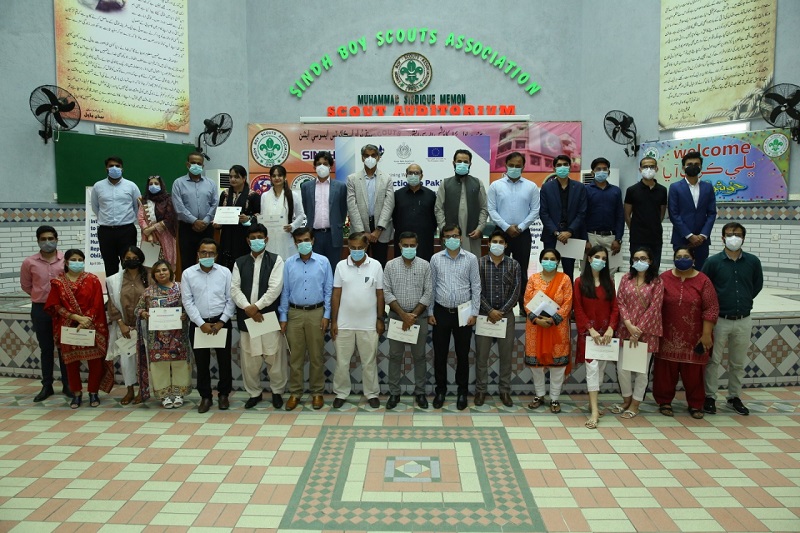- EU-funded Huqooq-e-Pakistan Project welcomed to Sindh, partnership with GoS on development of Provincial Human Rights Policy announced
KARACHI, Pakistan: Over 20 Sindh government officials received a two-day training on “Pakistan’s International Human Rights Reporting Obligations” organized by European Union-funded ‘Promotion of Human Rights in Pakistan (Huqooq-e-Pakistan)’ Project.
The training was held at the Sindh Boy Scouts Headquarters in Karachi.
The training was opened by the Sindh Human Rights Secretary Parvez Ahmed Seehar, was aimed at enhancing the technical and operational capacities of the officials of the Sindh Human Rights Department as well as the Sindh Treaty Implementation Cell in reporting and implementation of international human rights commitments of Pakistan.

The training modules and manual were designed and delivered under the leadership of HeP Executive Director, Expert Ali Dayan Hasan.
The Sindh HR secretary Mr. Seehar commended the efforts made by the Huqooq-e-Pakistan project in developing a flagship human rights training and capacity-building programme for Pakistan.
Mr. Seehar said that the training will help in equipping the department with the pre-requisite information required in fulfilling their mandates with respect to international human rights reporting.
Mr. Seehar also announced that the Sindh government with his department in the lead, would be developing Sindh’s first provincial human rights policy in collaboration with HeP.
“In addition to capacity-building initiatives and trainings, HeP has also offered us support in a historic first – the development of Sindh’s first human rights policy. The Human Rights Department and the provincial government as a whole, welcomes the efforts of HeP and hopes this engagement will deepen in the months and years to come,” the Secretary said
The HeP Executive Director Ali Dayan Hasan gave an overview of the Huqooq-e-Pakistan program and training objectives.
Ali Dayan Hasan said that the training program is designed in consultation with human rights stakeholders to ensure that the trainings reflected Pakistan’s realities and perspectives including the difference in provincial contexts. He added that the Project is deeply respectful of the responsibilities and authority conferred upon the provinces after the 18th constitutional amendment.
“Huqooq-e-Pakistan believes in working with all state human rights entities and institutions within the ambit of their constitutional authority. Decisions concerning the provincial matters will be made in Sindh and not in Islamabad and the project will play its role in ensuring the same without fear or favour,” said Mr. Hasan.
“On the part of the EU, the Project represents positive and constructive human rights diplomacy,” added Ali Dayan Hasan.
The EU Promotion of Human Rights in Pakistan (Huqooq-e-Pakistan) is a joint initiative of the EU and the Federal Ministry of Human Rights with the objective of supporting the continued efforts of the Government of Pakistan for the promotion of human rights.
However, human rights is a devolved subject under the constitution after the 18th amendment.
At the end of the training, Secretary Human Rights Mr. Seehar and Mr. Ali Dayan Hasan awarded certificates to qualifying participants.
In his concluding remarks, the Secretary thanked Huqooq-e-Pakistan, the EU, and participating institutions. He also talked about the EU interventions in Pakistan and said that respect for human rights and rule of law are at the core of all EU activities, including trade agreements.
The secretary further stated that these trainings facilitate stakeholders in understanding the reporting process, provides effective tools for reporting aiding in fulfilling the state’s treaty body obligations under the UN system.
